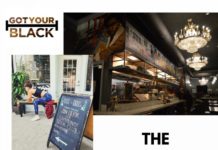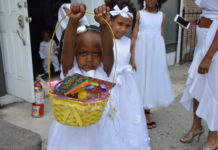Latasha Alcindor is Brooklyn before it was branded. With each project release the Afro-Latina rapper takes it’s listener down a path of sonic history, so rich in storytelling it should be added to a transplant syllabus. Her most recent album Teen Night at Empire recollects her experiences as a youth straight out of Flatbush, buying 2 for $5 mixtapes and dancing in Crown Heights most infamous skating rink. If Teen Night is nostalgic of the past then B(LA)k, her project from earlier 2017 is a reaction to the boroughs rapidly changing environment and a desire to hold on to what’s left of Black culture in Brooklyn.
Diva: What was your thought process with B(LA)k?
Latasha Alcindor: B(LA)k took four years to create because I was dealing with so much internal stuff before that. The album is so deep it’s really about my blackness and growing up in Brooklyn and navigating the changes happening within the black community in Brooklyn. I wanted it to be as amazing as possible, but I didn’t have the resources yet to get to that point. I was recording on my little apogee mic and one day I couldn’t sleep, my skin was all itchy, and I screamed “God What do you want front me” and God was like “release B(LA)k” So I got up 5AM sent the album to Robin Jay at The Takeovah. She released it the same day and I just remember this heavy release off my shoulders, I didn’t know what was going to happen next. It was the first time I had done something super unplanned out of the whim, but I just knew I had to let go of it because the album wasn’t mine anymore. It did really well for a new album released with no planning or marketing. A lot of people resonated with the album and that’s what mattered to me was the connection
Diva: What about your process for Teen Night at Empire?:
Latasha Alcindor: Teen night started out as a bunch of freestyles. We wanted to make a back in the day hot 97 mixtape. I wanted to do a bunch of freestyles on beats that I loved, so I picked up beats like “you’re a jerk” and some Nas. Then we basically took out those beats and made new beats around my freestyles.
It’s dope now because everyone is writing about Empire. The New York Times just wrote an article on it and Mass Appeal. I’m a first account knowing of Empire. I used to go often and watch all the hood-ratness that would happen there. It was like my first time going to a club and my first understanding of what a club would feel like. Nobody skated everybody was just dancing. It was a good time. I miss it for the younger kids because that was an opportunity for them to get together and now they don’t really have spots like that. Even people who don’t know anything about Empire resonate with the project and that’s what’s dope to me. During the time that I was going to Empire I remember lived off bootleg CD’s. The album is really dedicated to those parts of my memory and releasing them. I feel because gentrification is happening we’re dealing with this disappearance of all that memory and culture. I’m here for change, I understand change is inevitable and it’s going to happen, but I’m also here for writing the history because this is history to somebody. We live our lives reading textbooks and whatever they give us and if anything, I hope that my music could be textbook to somebody and give knowledge about something you didn’t know that existed and inspire you to do something.
Diva: What’s next?
Latasha Alcindor: I started a residency with National Sawdust and they allowed me to grow this performance art show that uses theatre, music, dance and documentary to tell the story. It started out as B(LA)k and then it became All A Dream and now it’s turning into this project I’m releasing in February at Brooklyn Museum called All A Dream: Intro to Latasha.
Diva: Can you give me a little preview of that?
Latasha Alcindor: You’ll get to know just me. 2017 was really dedicated to my environment and getting to see what I see. Now I want you to get to know my mind. It’s that, mixed with some of B(LA)k and Teen Night so you’ll get to hear some new music and new feelings. It’s going to be dope. I’m stepping into my power this year.
Diva: You grow up right here in Flatbush right?
Latasha Alcindor: Yea, Flatbush is my heart it’s everything I know. I’ve moved to other parts of Brooklyn before I’ve lived in Sheepshead, Canarsie, Bedstuy, but there is something about Flatbush that is so me because of the West Indian connection here. I’m Panamanian, Puerto Rican, Haitian and Jamaican. I’m all the crazy ones but Flatbush literally gives me all of that right here. I feel like home her

Diva: You attended Wesleyan, a super prestigious predominantly White college. What did you study?
Latasha Alcindor: I studied African American studies and psychology, but my concentration was on Black performance arts and my deeper concentration was Hip Hop. I created a 40-page thesis based on the story of Hip Hop and then I had a performance piece that focused on the roots of hip-hop. It resonated with the rest of my life because I didn’t know I was going to be a rapper. I left school thinking I was going to pursue journalism.
Diva: When were you first aware of gentrification?
Latasha Alcindor: I knew gentrification was happening as soon as I got back from school. I saw Connecticut Muffin on Cortelyou in 2010. That was the first thing that hit. Now you go to Cortelyou that whole block is gone. Everything I knew is gone. There’s only one Chinese spot left. All of a sudden everything that [Wesleyan] was teaching me was happening in Brooklyn it was like my eyes were opening up. All the institution and implicit racism was all in my face now. I knew, but I think Wesleyan open my eyes to all the information.
Diva: What does Blackness mean to you?
Latasha Alcindor: I never thought about the word blackness because I was in it. I knew there were White people. It wasn’t until I got to Wesleyan that I understood whiteness. How it circulates around us, and fucks up people’s minds and their power. Because I’ve always been surrounded by powerful spiritual Black people so it never phased me that there was a problem here until I got older. It’s hard to define my blackness, it’s a part of my truth. I can’t say who I am without talking about being black. The Culture, people, food, language, it everything. And my womanhood is the same way. It’s interesting I’m dealing with this tug of war where I’m like “what first my blackness or my woman hood” and it’s just as equal. Some days one takes further notice than the other but they’re just as important. I wouldn’t be who I am today if I didn’t have both.
Diva: Afrolatinx people often occupy a weird space where both their Latinness and Blackness is questioned. What was your experience as an Afro-latina?
Latasha Alcindor: I’m way darker than my mother so no one thought I was Latina. I went to school and people thought I was Black or Caribbean but when I speak Spanish people are like wow are you Latina. But that’s all a result of colorism taking over especially. in Caribbean and Latino spaces colorism is a big thing. Even in the industry… How many dark skin Latina women do you know popping off. There are a lot of dark skin women who don’t make it.
Diva: How does your multicultural background influence you and your music.
At the root of it I grab from what resonates with my soul. As for my culture – I grew up listening to merengue and bachata at one point and the next minute listening to Patra and Buju, then the next minute I’m listening to some crazy reggaeton shit, and then some vodou music. This is my life and I had to figure out how to make sense of it all. And I tried to I put it in everything. Lil Haiti on SongCloud has Haitian vodou music mixed into, Eggs I’m speaking in Spanish and B.C. has reggae involved but it has that bad boy element.
Diva: How do you feel about Cardi B’s story and how the game is pitting her and Nicki against each other?
Latasha Alcindor: I love her I think she’s amazing. I’m here for a Cinderella Story too. I all for someone who’s an underdog and then they take their shit and fuck it all up.
I think that’s dumb but Nicki comes from a different time when there was a there can “only be one female rapper era”. It’s sad that the game is still putting women against one another.
Diva: On staying motivated despite obstacles
Latasha Alcindor: I don’t like to cut myself short. I live my life not telling myself that because I’m this, this won’t happen. Everyone has challenges.
“We all have to overcome in this life. My Blackness and my womanhood won’t stop me from becoming the woman that I’m going to be.”








